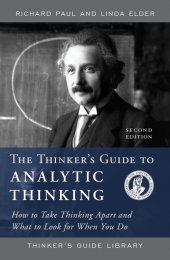The Thinker's Guide to Analytic Thinking: How to Take Thinking Apart and What to Look for When You Do
Second Edition
Linda Elder and Richard Paul
Contact Info for Bloomsbury:
- For questions about orders you have already placed, email weborders@mpsvirginia.com or telephone 888-330-8477, ext. 7527.
- For questions about eBook purchases or pre-orders, email contact@bloomsbury.com.
- For general enquiries not related to online orders, call 1 212-419-5300 or email contact@bloomsbury.com.
Linda Elder and Richard Paul’s The Thinker’s Guide to Analytic Thinking explores the practice of analyzing problems and opportunities, providing a framework for finding common denominators, inconsistencies, biases, and underlying causes. It helps readers learn to think within the logic of subjects and professions. By offering proper tools for analysis and assessment of thought, it empowers readers to address any decision with confidence.
As part of the Thinker’s Guide Library, this book advances the mission of the Foundation for Critical Thinking to promote fairminded critical societies through cultivating essential intellectual abilities and virtues across every field of study across world.
Pages: 56 • Trim: 5 1/4 x 8
978-0-944583-19-7 • Paperback • January 2016
978-1-5381-3375-0 • eBook • January 2016
Series:
Thinker's Guide Library
$26.95
Additional Information About:
The Thinker's Guide to Analytic Thinking: How to Take Thinking Apart and What to Look for When You Do
Why a Guide on Analytic Thinking?
Analysis and evaluation are recognized as crucial skills for all students to master. And for good reason. These skills are required in learning any significant body of content in a non-trivial way. There are many varieties of analysis specific to particular disciplines and technical practices. These forms of analysis often require technical training of a specialized nature. For example, one cannot do qualitative analysis in chemistry without instruction in chemistry.
What we have provided in this guide, however, is the common denominator between all forms of analysis because all forms require thoughtful application and all thought presupposes the elements of thought. For example, one cannot think analytically FOR NO PURPOSE. Or think analytically, with NO QUESTION in mind.
In order to develop the analytic mind, there must be guidance, instruction, and practice in monitoring thinking using intellectual tools applicable to every discipline. Everyone needs to learn to question purposes, goals, problem definitions, information, concepts, etc. It is these interdisciplinary analytic tools that enable those skilled in them to understand and assess their analytic thinking, whether in a highly technical area or in an everyday personal application. It is these analytic tools that enable one to get at the most fundamental logic of any discipline, subject, problem, or issue. They provide the means for transfer of learning between and among subjects and disciplines. They enable motivated persons to gain an overview of their learning in any and every situation analyzed, to think their way into and out of various intellectual domains.
This thinker’s guide serves as a launching pad toward analytic proficiency.
Contents Include:
- Why a Guide on Analytic Thinking?
- Think About Purpose
- State the Question
- Gather Information
- Watch Your Inferences
- Check Your Assumptions
- Clarify Your Concepts
- Understand Your Point of View
- Think Through the Implications
- The Spirit of Critical Thinking
- Analyzing the Logic of Human Emotions
- Analyzing Problems
- Analyzing the Logic of an Article, Essay, or Chapter
- Analyzing the Logic of a Textbook
- Evaluating an Author’s Reasoning
- Analyzing the Logic of a Subject:
- Science
- History
- Sociology
- Economics
- Ecology
- Analyzing and Assessing:
- Goals, Purposes, or Objectives
- Questions, Problems, and Issues
- Data, Evidence, Experience, Research
- Inferences, Interpretations, and Conclusions
- Assumptions and Beliefs
- Concepts, Ideas, and Theories
- Points of View and Perspectives
- Implications and Consequences
- Distinguishing Between Inferences and Assumptions
